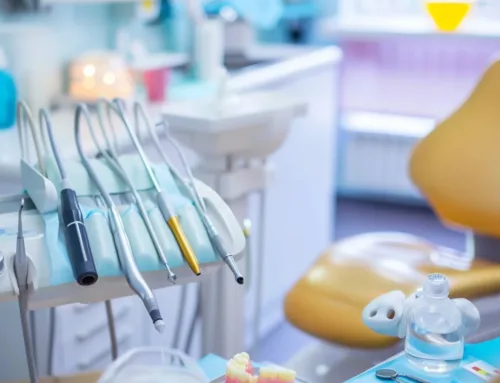Treatment & Prevention of Dental Issues due to Dry Mouth
Dry mouth is annoying, but it can lead to more serious dental health issues if it is ignored or left untreated. It’s important to take action to address the symptoms and underlying causes of dry mouth in order to maintain your dental health and keep your teeth strong and resistant to decay. Let’s explore the potential causes of dry mouth, what complications may arise due to dry mouth, and how dry mouth can be treated and prevented.
We all deal with seemingly minor health issues every day. A bad day at work leaves us with a headache, other times our stomach is not happy with our food choices that day. Most of these situations end up just being little annoyances that are temporary. But, when they recur again and again, they could be signals that there’s something more serious going on. In addition, the longer they go untreated, the risk for other problems developing increases. The same is true with dry mouth, a dental health condition many people live with and dismiss as nothing more than one of life’s little annoyances.
However, as we will explore here, dry mouth can certainly lead to more than just needing a drink of water from time to time. In fact, chronic dry mouth can be an indicator of a wide range of underlying health problems, and if left untreated can even cause other issues to arise. Let’s start by examining what exactly defines dry mouth, and what the possible causes of it may be.
Signs & Symptoms of Dry Mouth
We’ve all experienced the sensation of having our mouth dry up on occasion. It’s an uncomfortable sensation on the tongue, lips, and inside of the cheeks. It feels sticky, dry, and perhaps pasty. Food seems to get stuck when you try to swallow, and when you try to speak it feels like your words get caught and are hard to get out. The normal level of lubrication inside your mouth to make it easy to swallow foods and articulate your speech is provided by saliva. However, when the saliva glands unexpectedly act up and don’t function normally, it quickly creates a very dry environment in the mouth. Why does this happen? Well, there are several possibilities to consider.
Common Causes of Dry Mouth
There are many reasons why someone may experience dry mouth on occasion, however these can often be explained by situational factors or aspects of our lifestyle choices. For example, dry mouth can be due to something as simple as being dehydrated and needing to drink a little more water each day. It could also be due to a sudden onset of anxiety or stress, if certain types of situations cause you to be nervous or uncomfortable. Other situational and lifestyle factors include the use of alcohol, tobacco, or other drugs.
In addition, dry mouth can also be a side effect of certain types of medication. If you are taking any medications and suddenly begin experiencing dry mouth, be sure to check with your doctor to see if this is a possibility. On a similar note, there are many health conditions that can manifest symptoms such as chronic or frequent dry mouth. Some of these include diabetes, autoimmune diseases, and certain types of neurological conditions. Patients undergoing chemotherapy or radiation therapy for cancer may also be susceptible to dry mouth. In cases like these, doctors may be able to offer solutions to mitigate the effects and relieve the symptoms.
Whatever the underlying cause may be, it’s very important to seek out treatment to address the problem and prevent it from progressing. This may include an examination with your dentist or a consultation with your family doctor, as they will be able to provide additional insight into possible causes and recommend a course of action. Failure to take appropriate action when chronic dry mouth is occurring can lead to more serious health problems down the road.
Short-Term & Long-Term Oral Health Effects of Dry Mouth
The impact that dry mouth can have on your health might not be totally apparent in all cases, but even from the very beginning there are subtle effects occurring in your mouth, on your teeth, and around your gums. You see, the usual level of saliva in the mouth does more than just provide lubrication for speaking and eating. It also works to inhibit the growth and build-up of bacteria and plaque on the teeth, which can thrive in a dry mouth. This will result in foul breath almost immediately, and as bacteria continue to reproduce in the mouth they can accelerate the decay of tooth enamel and lead to infections in the gum tissue.
Over time, dry mouth can also develop into lesions or sores inside on the gums, tongue, or inner cheeks. Other effects have been known to include an uncomfortable sensation of tingling or soreness in the soft tissues of the mouth, inflamed gums, or swollen tongue. Experiencing these effects can hinder the appetite, the ability to taste, and comfort while eating, chewing, and drinking, thereby having a negative influence on the quality of someone’s diet and nutritional intake. Eventually, this gradual decline in nutrition can most certainly lead to many other types of general health issues, far beyond the health of the mouth itself.
Clearly, dry mouth is not something that should be ignored or pushed aside. It may be a sign of something more. Determining the root cause of the condition is critical, and starting on an effective treatment plan as quickly as possible can halt the condition and restore the health of the mouth.
Treating & Preventing Dry Mouth
Treating dry mouth begins by understanding exactly what’s causing it, however this isn’t always easy to determine. To aid in diagnosing the cause, it’s important to be mindful of when the condition occurs, as this can often work to pinpoint if dry mouth is situational, or may be linked to another health issue.
For starters, making an effort to stay hydrated more regularly can certainly help eliminate dehydration as a possibility. Dry mouth caused by stress or anxiety should be fairly easy to identify, as other times the condition will not be as noticeable. Finding ways that work to relieve stress or mitigate the feelings of anxiety should help for people who experience dry mouth for these reasons. Cutting back on other lifestyle factors such as alcohol consumption and tobacco usage should also result in an alleviation of the effects of dry mouth, as well as a reduction in the frequency and severity of the dryness.
In the event that the dry mouth is due to certain types of medications or ongoing health conditions, medical attention should be obtained. It’s possible that alternative medications may be available to you that do not produce the same side effects. Additionally, there are saliva stimulants that can be prescribed to help increase the production of saliva in the mouth to combat the effects of dry mouth. Your doctor should be able to provide detailed information on these and whether or not they are suitable for your specific condition.
One of the best ways to prevent dry mouth and alleviate it is to maintain a solid oral care routine every day at home. Removing the bacteria and plaque that exacerbate the harmful effects of dry mouth is helpful in treating the symptoms and providing daily relief. Using a good quality fluoride toothpaste with a soft bristled toothbrush, flossing daily, and using an antibacterial oral rinse helps freshen the breath, destroys odor-causing bacteria, and strengthens the enamel of the teeth to ward off decay. Furthermore, it’s essential to stick to the recommended schedule of dental checkups to have your teeth professionally cleaned and monitored for any possible issues that may develop. Your dentist and hygienist are your most powerful allies in the fight against dry mouth.
Learn More about Dry Mouth & Get Relief Today
If you’ve been experiencing an increase in the number of times your mouth feels dry, sticky, and uncomfortable, you should book an appointment to speak with your dentist today. The key to avoiding problems related to dry mouth is to deal with the underlying causes promptly, before they have a chance to progress. Having your teeth professionally cleaned, removing any stuck-on tartar and reinforcing your enamel with a fluoride treatment, can do wonders to rejuvenate your mouth. Contact the team of friendly dental professionals here at Georgian Dental today to arrange for your next visit. We look forward to seeing you again soon!
Appointment Request
If you’re interested in any of our procedures, and would like to meet with one of our dentists to discuss options, costs and get additional information, complete this short form and we’ll give you a call to arrange for a no-obligation appointment at our Barrie clinic.










